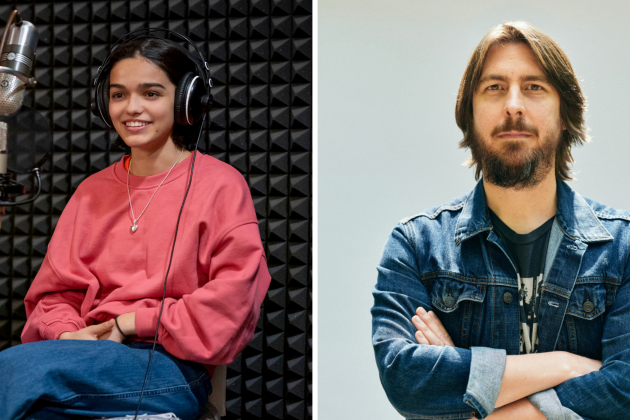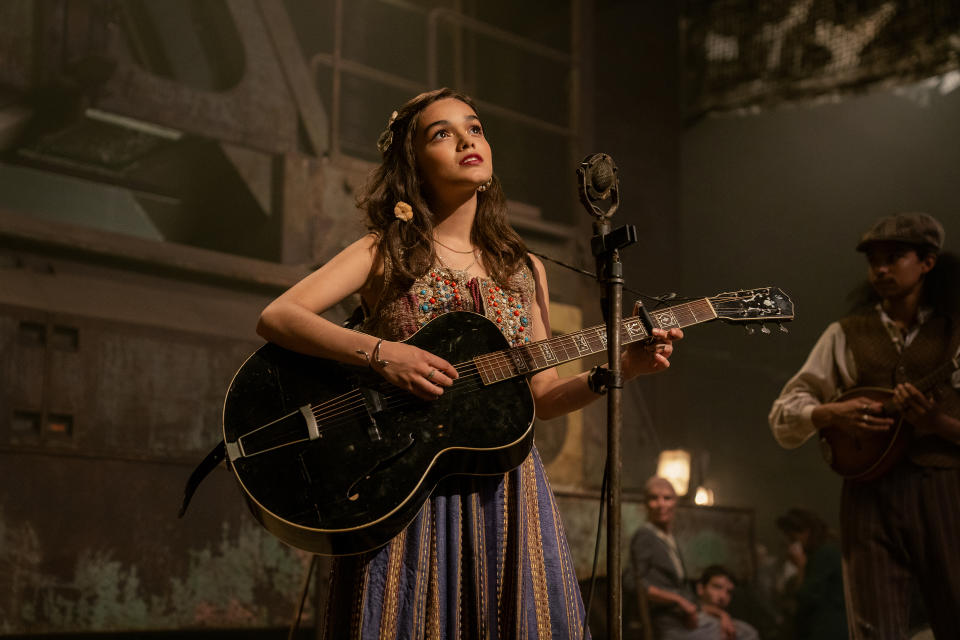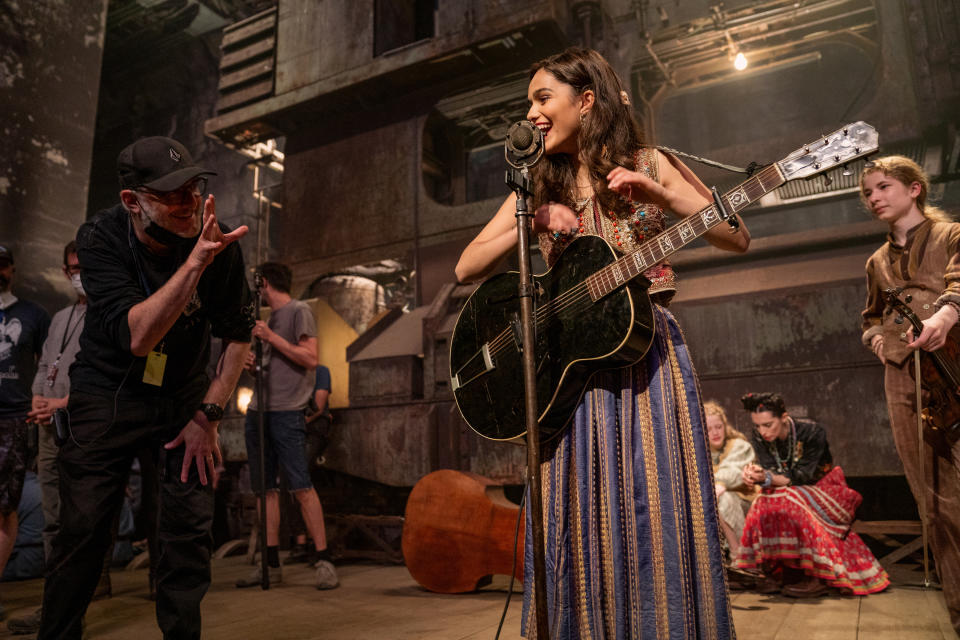Rachel Zegler and Dave Cobb Explore the Music of ‘Hunger Games: Ballad of Songbirds and Snakes,’ From Why She Sang Live On-Set to How the Smiths Figured In
- Oops!Something went wrong.Please try again later.
- Oops!Something went wrong.Please try again later.
- Oops!Something went wrong.Please try again later.
- Oops!Something went wrong.Please try again later.
- Oops!Something went wrong.Please try again later.
- Oops!Something went wrong.Please try again later.

With Lionsgate’s “The Hunger Games: The Ballad of Songbirds and Snakes” looking to continue its reign at the top spot of the box office, it’s time to consider the most sonorous secret to its success: its original, bluegrass-tinted song selection, including a theme written and produced by Dave Cobb (with lyrics from “Hunger Games” author Suzanne Collins), and sung soulfully by the film’s star, Rachel Zegler.
Reaching back to the 2020 prequel novel by Suzanne Collins that the movie is based on, Zegler points out how clearly Appalachian Lucy was, and how her accent exists in that vernacular throughout the duration of the novel, something that was destined to carry over into the music.
More from Variety
“District 12, where we exist canonically, lies in North Carolina and the Appalachian Mountains,” says Zegler, speaking from New York. “I’m glad Francis (Lawrence, the director) wanted to explore that — he even sent me the trailer for ‘The Coal Miner’s Daughter’ to give me an idea about the accent — but more so that Suzanne was passionate about it musically, as she used to be a country music DJ.”
Cobb’s songs and production techniques added the perfect touch as Zegler was a fan of the producer-writer’s work with Dolly Parton and John Prine. Between that, and the additional influences of 1930s and 40s music that Cobb brought to “Hunger Games,” Zegler’s vocal game was changed for the better. “The intention to keep Lucy authentic to the Appalachian culture was very important, and I think Dave and his musicians had a great time exploring that… I was glad we weren’t trying to make it ‘palatable’ for younger audiences by giving it a pop music vibe.”
Known in the film world for his production work on “A Star Is Born,” “The Eyes of Tammy Faye” and “Elvis,” Cobb came up with a “Hunger Games” song list that not only includes several of his freshly penned selections, but “Lucy Gray’s Version” too — a new take on score composer James Newton Howard’s “The Hanging Tree,” originally sung by Jennifer Lawrence in “Hunger Games: Mockingjay, Part 1.”
“I’ve admired the tune since “Mockingjay,” so when I found out they wanted to market the new film with my version, I was brought to tears,” says Zegler.

For Cobb – whose production bona fides include Waylon Jennings, Jason Isbell, Elle King, Chris Stapleton and Brandi Carlile – writing for and producing Zegler’s dynamic voice is no different than working with his country and Americana clientele.
“I’m just trying to make the best version of an artist at that time,” Cobb says from Savannah, GA, regarding his process when handling artist albums and cinematic soundtracks. “I want to represent everyone honestly… focus on their stories. Film is just an imaginary version of that storytelling. Only with ‘Hunger Games’ we had to imagine a dystopian Appalachia in the future, and tried to find the most honest representation of the characters in the Covey, and of Lucy Gray Baird. And that was a blast.”
Beyond the tenderness of Collins’ lyrics and Cobb’s melodies, Zegler seems most proud of the fact that she performed and recorded live on set, and how her decision to do so affected the dynamics of her acting as well as her vocalizing.
Regarding the power of live on-set performance, Zegler states that it simply “adds something audiences miss when it’s gone. Singing in a film and singing live onstage are two different types of performances, sure, but you should be able to demonstrate both in your art when you’re working in the world of both musicals and film. Singing live for every take five days a week is not easy. But it brings something alive to the world of a film.”
Pointing to the force of capturing “The Ballad of Lucy Gray Baird” on set, Zegler wanted badly to have its live element last all throughout the movie. “Dave’s music is like another character, filling in the gaps where dialogue does not do Lucy Gray justice,” she says. “And there’s a rawness to the music that truly fits in District 12— solace in the midst of the pain and suffering in a post-war society. Singing live added layers to a performance that canned vocals cannot.
“I was so moved singing ‘The Old Therebefore’, which is Lucy Gray’s last-ditch effort to survive snakes in the arena,” Zegler continues. “I had to pretend that where these venomous, neon-colored snakes were climbing up my dress while singing Suzanne’s beautiful words, and staring straight down the barrel of the lens. I had never felt so powerful or sure of myself on a set before. And that’s partly due to Francis being one of the best directors in the game, but also because I was able to bring a craft I have been training for half my life. That’s what it truly means to show up to work.”
Cobb says the earliest conversations involved director Francis Lawrence and Collins “going down the rabbit hole” of traditional Appalachian music. “Francis knew his stuff, and that was an easy starting point. But Suzanne is a country aficionado — she was a DJ in college — and is really well-versed. Suzanne knows everything about the Carter Family, Doc Watson, all of these turn-of-the-century records I adore also.”
Cobb’s and Collins’ shared love of vintage country and bluegrass sounds created a shorthand between them as collaborators, a musical dialogue that allowed him to visualize everything that the author put forth – be it in their writing or exchanging favorite records from Clarence Ashley and the Carters. “Collins would talk about these characters so vividly you could see them,” he said. “Suzanne has a universe beyond a universe beyond a universe, all with such depth. And she really pushed me to go for it. We made a great team. Plus, the lyrics were already in her books, so I had a master class in literature, and had the ability to go wherever I wanted with the music.”
Admittedly not a “Hunger Games” book series reader before this project, Cobb devoured Collins’ writings and lyrics, made his own melodies based on her texts, and sent everything back and forth to the creative team. “They were all such great cheerleaders – so, so positive,” he said. “That gave me the confidence to keep digging… You’re writing for this fictitious post-apocalyptic future, but you want to keep it honest. And honesty is the key factor in every film I do, whether it’s (characters like) the larger-than-life Elvis or Lucy Gray Baird. I want everything I do to feel tangible.”
Renting a 250-year-old house in Savannah to record his “Hunger Games” songs with vintage equipment from the 1940s for the sake of authenticity, Cobb wanted to be able to hear the history embedded in the walls of his makeshift studio. “I wanted it all to sound like they were on a porch in a rocking chair, singing and strumming like an Alan Lomax recording.”
Then came Zegler. Fresh from being the Maria behind director Steven Spielberg’s 2021 take on “West Side Story,” Zegler had been on the “Hunger Games” producers’ minds “from the get-go,” says Cobb, adding that, as a producer and songwriter, “we aimed for the stars” considering her potential involvement. “We knew that Rachel could do whatever, that she had zero boundaries as a talent.”
Cobb’s melodies for songs such as “Pure as the Driven Snow” (“my personal favorite”), “Nothing You Can Take From Me,” and “The Old Therebefore” were designed for maximal beauty and lilting musicality … and to complement the religiosity of the God-fearing lyrics. “The words are usually pretty much you’re gonna die – maybe today, maybe tomorrow,” Cobb laughs. “But a song like ‘Nothing You Can Take from Me,’ I gave it a sad melody, while its lyrics are filled with joy and strength, and real empowerment from Rachel, based on history and the reinvention of it.”
Cobb says that there was an extra added hint of the Smiths to his songwriting, with more than a few Morrissey-Marr-like moaning chords in the mix. “The story is set in the future… they would have heard of the Smiths in the future,” he says with a laugh. “There’s definitely some Smiths in ‘Pure as the Driven Snow.'”
Along with being influenced by his and Collins’ love of Appalachia, to say nothing of the Smiths, the songwriter-producer fell under the spell of the folk music of the British Isles, the big-band sound of the 1930s and 40s, and haunting vocalists such as Jo Stafford.
“We knew that Rachel could deliver on that over-the-top vocal quality, so when she actually got to us, filming and singing in Germany and Poland, doing scratch vocals and pre-records, it was even better than I could imagine,” says Cobb. “No matter how high our expectations were of her, Rachel surpassed them. Nothing was impossible for her; she did everything in one or two takes.”
On the subject of capturing Zegler singing live on-set and nailing her tracks with ease, Cobb is positively breathless. “What can I say… she’s Rachel. When you do a film, you always pre-record just in case. But Francis was there in the room when we first started her vocals, and immediately knew that Rachel could nail this live. In fact, she stepped it up even more when they called ‘action’ on set, because she’s reacting to the crowd and the script’s situations. Very few people can do what Rachel does.”
What Rachel Zegler does for the music of “The Ballad of Songbirds and Snakes” is thoroughly explained during an email conversation from her home in New York City.
Comparing the vocal nuances of her work on the new “Hunger Games” with director Francis Lawrence with that of her last employer, Stephen Spielberg, and his iteration of “West Side Story,” Zegler is precise.
“Spielberg had never directed a musical, while Lawrence built his career on directing some of the most iconic music videos known to man – Gaga’s ‘Bad Romance’ being my personal favorite,” says Zegler. “Yet an inherent knowledge about direction in regards to the musical elements in each film came naturally to both. Spielberg is a legend, and had a deep appreciation for Bernstein’s score and Sondheim’s lyrics that shone through his careful direction of the musical numbers, as well as the way they organically flowed in and out of Tony Kushner’s dialogue. Francis had a tougher job: fitting music into a popular dystopian setting that young people have subscribed to for over a decade. With that — and this goes for both movies — everything became more of a collaboration.”

Thankful for the trust she received from Spielberg and Lawrence, respectively, Zegler says that it was her decade’s worth of training that allowed her to switch from a voice like María’s to that of Lucy Gray Baird.
“It rests in how one approaches their consonants (or a consonant orchestra), the positioning of their larynx, their glottis, their epiglottis, even their tongue,” she says. “María was approached with much more softness, with her volume rising with her confidence. I only sing in full voice in ‘West Side Story’ during ‘A Boy Like That,’ ‘The Balcony Scene’ and ‘I Feel Pretty.’ The rest was very quiet, very pensive, something I explored with Jeanine Tesori, the vocal producer on ‘West Side Story.'”
When it came to Lucy Gray, however, Zegler maintains there was more freedom to let loose based on the character’s job and passion. “She even says, ‘I don’t sing when I’m told, I sing when I have something to say.’ And working with Dave Cobb made that especially exciting, as he tends to work with musicians who have the same attitude towards their talents. I trusted him from the word ‘go.’ And Francis sat in the booth with me to not only get a feel for how it would sound on the soundtrack, but — since I sang live in the film itself — how I would sound on set each day. That made me feel really comfortable when it came time to shoot.”
Zegler mentioned not growing up with country music during her formative years in New Jersey, but that she found deep appreciation for Joan Baez, Bob Dylan and Dave van Ronk at a young age (“my throughway to Dolly, Loretta Lynn and Patsy Cline”) and how working with Cobb connected dots to her listening diet’s past.
“Dave worked with Springsteen (as mixer) when the Boss went country on ‘Somewhere North of Nashville,’ and I’ve always been a huge Springsteen fan, so maybe that had something to do with it.”
Like Cobb, Zegler says her favorite track to the new “Hunger Games” is “Pure as the Driven Snow,” a love song crooned to her mentor in the movie, the future President Snow, and actor Tom Blyth. “There’s so much longing, so much to be said in such a simple melody, and so easy to sing to Tom for every take,” notes Zegler.
She poured through Suzanne Collins’ poignant lyrics: “She leaves it all on the page…. has an amazing rapport with Francis about where the boundaries of character choices are, how each actor should approach them, without isolating us from making choices on our own.” Zegler makes it clear that singing the author’s words was emotional for her. “That song is also the height of Lucy Gray’s love for Snow, which is such a beautiful thing to play and sing… It was a beautiful memory for me.”
Best of Variety
Sign up for Variety’s Newsletter. For the latest news, follow us on Facebook, Twitter, and Instagram.

